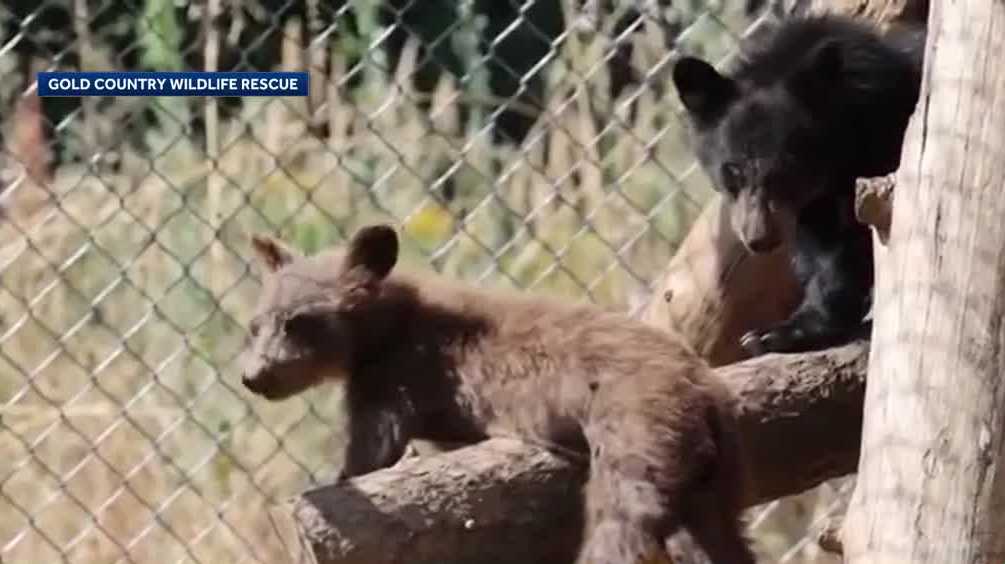Gold Country Wildlife Rescue in Placer County is caring for six orphaned black bear cubs, marking a record intake for the organization in just one week.The nonprofit is permitted by the California Department of Fish and Wildlife to take in native wildlife that are sick, injured or orphaned and rehabilitate them to return to the wild. “We have everything from hummingbirds up to black bear cubs and everything in between,” SallySue Stein, the founder of the Gold Country Wildlife Rescue, said. Between June 26 and July 2, the rescue took in six orphaned black bear cubs. Each cub is around 5 to 6 months old, weighing between 12 to 17 pounds. The cubs come from different areas, each with a unique story. “So, two came from Tahoe. There was a problem mother bear that was put down by CDFW. Another set of twins came from the Redding area, where there was a problem mother bear again breaking into chicken coops and things like that. And then we have a single from Shasta that mom was hit and killed by a car, which is very sad. And then we had another single from the Placer County, Rollins Lake area, and no one knows what happened to the mom,” Stein said.RELATED | Tahoe drivers urged to watch for bears after cubs hit by carsStein said the record intake reflects an important milestone for their rescue, but also just how much human activity is impacting black bears.The cubs will now spend the next 10 to 11 months in the “Summit University” bear rehab program. Stein said raising six wild cubs is a big commitment. “Right now, it’s about $15 per day per bear cub just for food, OK. So that’s when they’re 20 pounds or 25 pounds. You can imagine they’re usually 150 to 175 pounds by the time they’re released. So, our grocery bills get pretty high,” Stein said. “We also hide their food so that they have to learn to look for it and hunt. You know, we don’t just give them a dish of food. We make them act like bears.”The rescue operates almost entirely on donations and will need help to care for the cubs. Stein encourages those interested in helping to visit their website.”We really feel like these animals deserve a second chance,” she said.See more coverage of top California stories here | Download our app | Subscribe to our morning newsletter | Find us on YouTube here and subscribe to our channel
AUBURN, Calif. —
Gold Country Wildlife Rescue in Placer County is caring for six orphaned black bear cubs, marking a record intake for the organization in just one week.
The nonprofit is permitted by the California Department of Fish and Wildlife to take in native wildlife that are sick, injured or orphaned and rehabilitate them to return to the wild.
“We have everything from hummingbirds up to black bear cubs and everything in between,” SallySue Stein, the founder of the Gold Country Wildlife Rescue, said.
Between June 26 and July 2, the rescue took in six orphaned black bear cubs. Each cub is around 5 to 6 months old, weighing between 12 to 17 pounds.
The cubs come from different areas, each with a unique story.
This content is imported from Facebook.
You may be able to find the same content in another format, or you may be able to find more information, at their web site.
“So, two came from Tahoe. There was a problem mother bear that was put down by CDFW. Another set of twins came from the Redding area, where there was a problem mother bear again breaking into chicken coops and things like that. And then we have a single from Shasta that mom was hit and killed by a car, which is very sad. And then we had another single from the Placer County, Rollins Lake area, and no one knows what happened to the mom,” Stein said.
RELATED | Tahoe drivers urged to watch for bears after cubs hit by cars
Stein said the record intake reflects an important milestone for their rescue, but also just how much human activity is impacting black bears.
The cubs will now spend the next 10 to 11 months in the “Summit University” bear rehab program.
Stein said raising six wild cubs is a big commitment.
“Right now, it’s about $15 per day per bear cub just for food, OK. So that’s when they’re 20 pounds or 25 pounds. You can imagine they’re usually 150 to 175 pounds by the time they’re released. So, our grocery bills get pretty high,” Stein said. “We also hide their food so that they have to learn to look for it and hunt. You know, we don’t just give them a dish of food. We make them act like bears.”
The rescue operates almost entirely on donations and will need help to care for the cubs. Stein encourages those interested in helping to visit their website.
“We really feel like these animals deserve a second chance,” she said.
See more coverage of top California stories here | Download our app | Subscribe to our morning newsletter | Find us on YouTube here and subscribe to our channel
